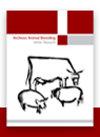Long-term administration of a commercial supplement enriched with bioactive compounds does not affect feed intake, health status, and growth performances in beef cattle
IF 1.6
3区 农林科学
Q2 AGRICULTURE, DAIRY & ANIMAL SCIENCE
引用次数: 1
Abstract
Abstract Feed additives including natural bioactive compounds (BCs) in combination with vitamin E (VitE) and organic Se could mitigate animal stress associated with intensive livestock farming due to their anti-inflammatory and antioxidant properties. Yeast and yeast derivate are included in feed additives as probiotic products and digestion promoters. Scutellaria baicalensis is a source of bioactive compounds and has been tested in monogastrics, exhibiting many immunostimulating and hepato-protective activities. However, the literature lacks information regarding S. baicalensis effects on beef cattle performance and health status. The aim of the present study was to evaluate the impact on beef cattle's feed intake, health and oxidative status, and growth performances of the inclusion of a commercial supplement (CS) containing VitE, organic Se, yeast derivate, and S. baicalensis extract during the fattening and finishing period. A total of 143 Charolaise male cattle were allotted into 12 pens of 11–12 animals each and assigned to a control ( 463.9±21.48 body weight – BW) or a treated ( 469.8±17.91 BW) group. Each group included two replicates of three pens. The treated groups were supplemented with 20 gCSanimal-1d-1 . Feed intake was measured monthly on a pen base during two consecutive days. Total mixed ration and fecal samples were collected at three time points (monthly, from November to February) and pooled by replicate for the analyses to monitor digestibility. Blood samples were individually collected at the beginning and at the end of the trial for oxidative status and metabolic profile determination. Final BW and carcass weight were individually recorded to calculate average daily gain, feed conversion ratio, and carcass yield. Similar feed digestibility between groups were observed during the whole experiment. Feed intake, growth performances, final body weight, average daily gain, feed conversion rate, oxidative status, and metabolic profile were not affected by the dietary inclusion of the tested CS indicating no detrimental effect of the treatment. Different doses of this product should be tested in the future in order to provide a more complete report on the product efficacy.长期服用富含生物活性化合物的商业补充剂不会影响肉牛的采食量、健康状况和生长性能
天然生物活性化合物(BCs)与维生素E (VitE)和有机硒(Se)配合使用具有抗炎和抗氧化作用,可减轻集约化养殖动物应激。酵母及其衍生物作为益生菌产品和消化促进剂包括在饲料添加剂中。黄芩是一种生物活性化合物的来源,并已在单品中进行了测试,显示出许多免疫刺激和保护肝脏的活性。然而,文献缺乏黄芩对肉牛生产性能和健康状况的影响。本研究旨在评价在育肥和育肥期添加含VitE、有机硒、酵母衍生物和黄芩提取物的商业补剂(CS)对肉牛采食量、健康和氧化状态以及生长性能的影响。选用143头夏朗兹公牛,随机分为12个栏,每栏11-12头,分为对照组(463.9±21.48体重- BW)和试验组(469.8±17.91 BW)。每组2个重复,每组3支。给药组添加20只 gCSanimal-1d-1。采食量每月连续测定2天。在3个时间点(11月至2月)采集混合日粮和粪便样品,重复收集,监测消化率。在试验开始和结束时分别采集血液样本以测定氧化状态和代谢谱。分别记录末重和胴体重,计算平均日增重、饲料系数和胴体产量。整个试验期间,各组饲料消化率基本一致。采食量、生长性能、最终体重、平均日增重、饲料转化率、氧化状态和代谢特征不受饲料中添加所测试CS的影响,表明该处理没有有害影响。今后应对该产品的不同剂量进行测试,以便提供更完整的产品功效报告。
本文章由计算机程序翻译,如有差异,请以英文原文为准。
求助全文
约1分钟内获得全文
求助全文
来源期刊

Archiv Fur Tierzucht-Archives of Animal Breeding
农林科学-奶制品与动物科学
CiteScore
3.20
自引率
0.00%
发文量
41
审稿时长
18-36 weeks
期刊介绍:
Archives Animal Breeding is an open-access journal publishing original research papers, short communications, brief reports, and reviews by international researchers on scientific progress in farm-animal biology. The journal includes publications in quantitative and molecular genetics, genetic diversity, animal husbandry and welfare, physiology, and reproduction of livestock. It addresses researchers, teachers, stakeholders of academic and educational institutions, as well as industrial and governmental organizations in the field of animal production.
 求助内容:
求助内容: 应助结果提醒方式:
应助结果提醒方式:


